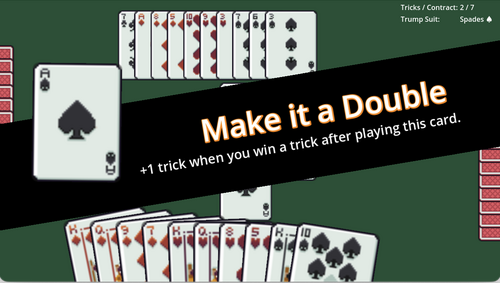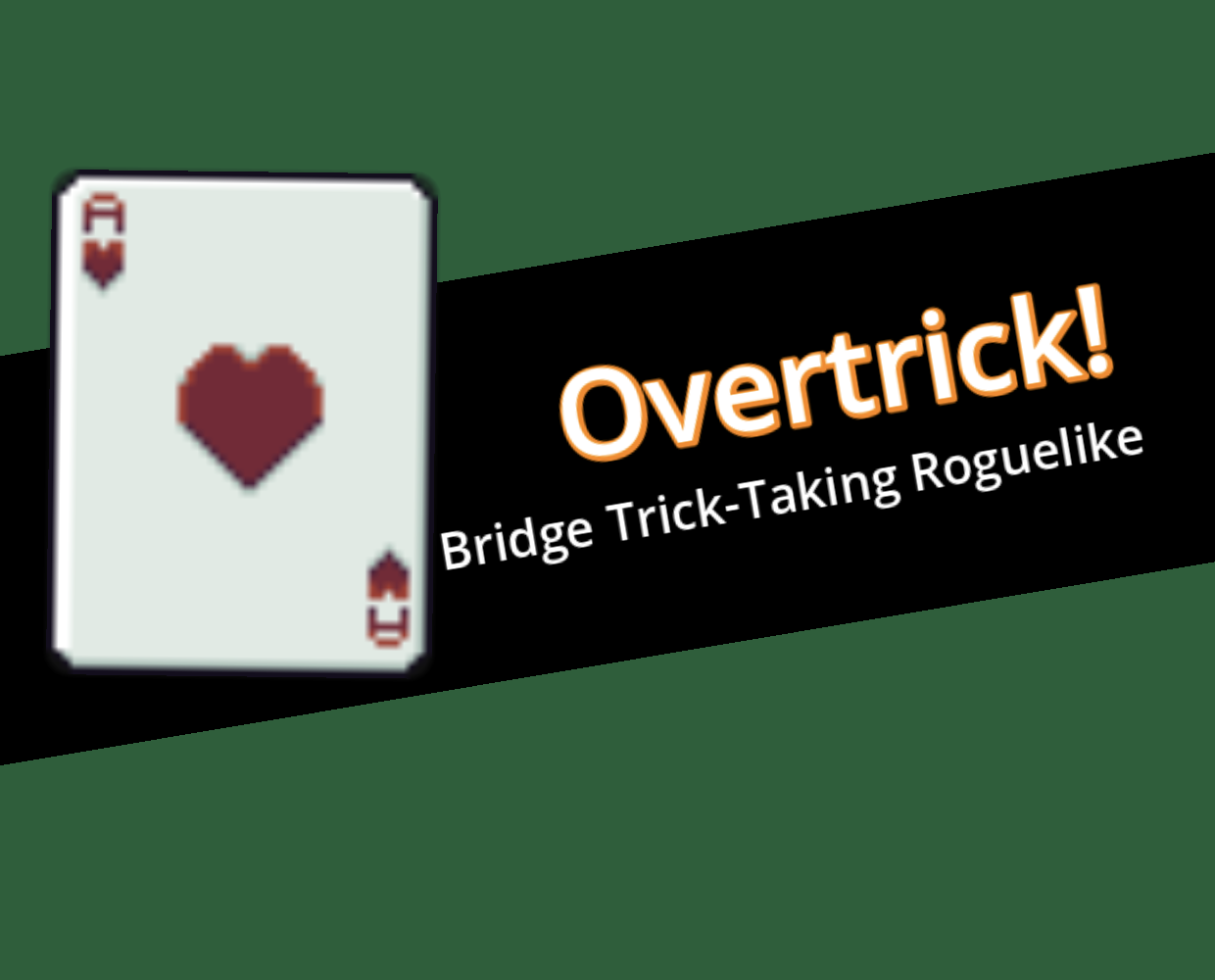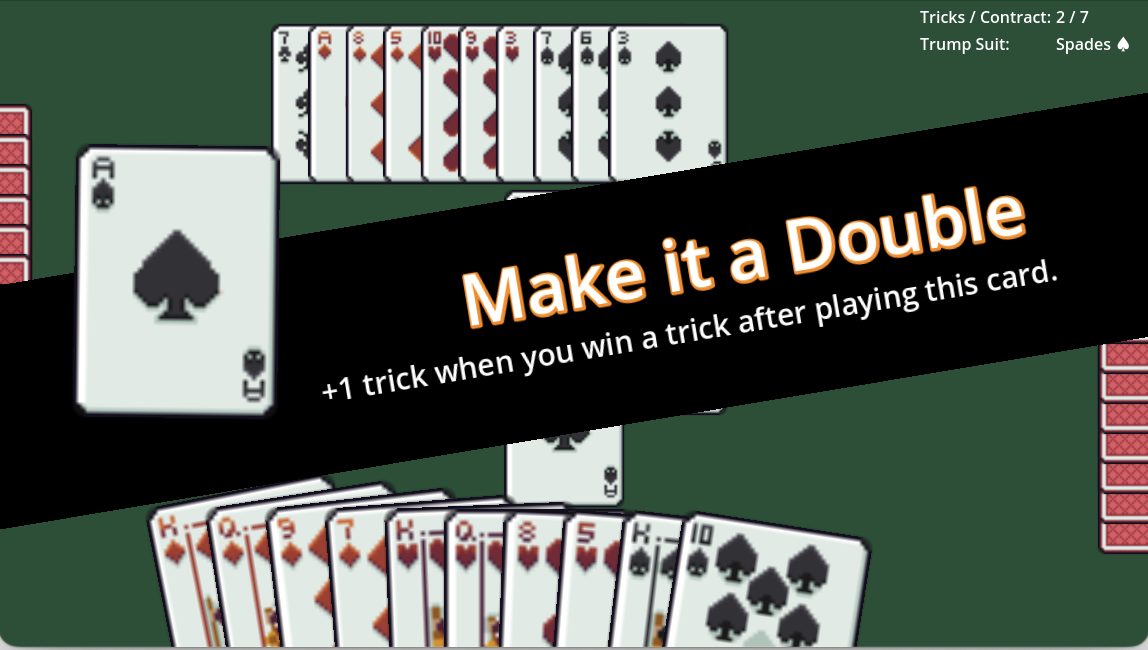Overtrick Devlog #1: Turning Bridge into a Single-Player Deckbuilder

As a kid, I was obsessed with Bridge. I’d endlessly lobby for it on family game nights. In the summer, I’d make my grandparents play. I learned three-player variants like Dummy Bridge, and even two-player versions like Honeymoon Bridge. If no one else was around, I’d play against myself.
Fast-forward to today: I'm a new dad (easily the hardest thing I’ve ever done), and my aunt came to help us take care of our baby. She’s a Bridge lover too—but her beloved Bridge club had to be put on hold. And since my son is still a few years away from being the fourth at the table, we had to find another way to play.
Why Overtrick?
I wanted to take what makes Bridge fun—clever plays, reading hands, maximizing a strong draw—and combine it with the single-player structure of deckbuilders like Balatro and Slay the Spire.
The result? Overtrick.
After building the first prototype, both my aunt and I were hooked. Turns out, playing Bridge solo is (surprise!) more fun than caring for a 3-month-old. (As cute as he is.)

What makes Overtrick so fun?
Bridge is at its most exciting when you're holding a great hand. But in traditional, 4-player Bridge, you only get the really good hand about 1 in 4 games (maybe don't quote me on that!). That means 25% of the time you’re on the hunt for glory—and 75% of the time you're just trying not to sink the ship.
But what if a single-player version could deliver that thrill 100% of the time?
To do this, I made two major changes:
- You always get a strong hand.
Every hand, you'll get at least 14 high card points. It doesn't guarantee a win, but it at least makes it feel possible. - Bidding is replaced by linearly increasing contracts.
Bidding is one of the most complex and human parts of Bridge, so simplifying it streamlines the experience and unlocks the possibility of a single-player experience. But bidding is also one of the most defining characteristics of Bridge, and the idea of an increasingly difficult contract to fulfill felt like it fit perfectly with the increasing difficulty necessary in a deckbuilding or roguelike game.
And it worked! My aunt and I loved playtesting Overtrick, and it took each of us several tries to win all 13 tricks in the final round.
But there’s room to make it even better.
What’s next?
To add variety and replayability, I’ve started adding special abilities to cards—kind of like relics or powers in deckbuilders. Currently, you can upgrade cards in your deck, and those upgrades give them new effects when played.
Sounds cool, right?
The catch is... these powers aren’t quite working yet. In some cases, they barely help you win. In others, they actually hurt your chances.
(That’s probably a whole devlog on its own.)

Do you have ideas?
I’m releasing a new version soon that completely overhauls card abilities. I think it’s more exciting and strategic—but it’s still missing something.
I plan to work on this game for a while. If you have ideas or feedback, I’d love to hear from you.
Also, let me know if you'd be interested in future posts. I’ve got notes on:
-
Building a basic Bridge-playing AI
Prototypes of different ability systems (what failed and why)
-
Potential roguelike progression systems
And, of course, a playable demo you can try.
Thanks for reading—and hope you’ll give Overtrick a shot!
Files
Get Overtrick
Overtrick
A Trick-Taking Roguelike
| Status | In development |
| Author | celloloops |
| Genre | Card Game, Strategy |
| Tags | Deck Building, Roguelike |
More posts
- What it's like releasing a Steam demo for the first time8 hours ago
- In With the New! (New logo, new Steam page, new tutorial, new gameplay.)7 days ago
- Gameplay Update: 7-Card Hands35 days ago
- Discord, Edith and Wanda, and Realizing Art is Difficult53 days ago
- 🎵 Dynamic Music and SFX69 days ago
- Naomi and Selene, Overtrick’s First Partner Duo83 days ago
- Building New Playstyles Around Existing Cards98 days ago
- Overtrick v0.6: Making Overtricks RewardingAug 28, 2025
- Overtrick v0.5: Flush Trumps, Finesse, and More New Special CardsAug 21, 2025
- Overtrick v0.4: Visual Update and Opponent AIAug 18, 2025

Leave a comment
Log in with itch.io to leave a comment.